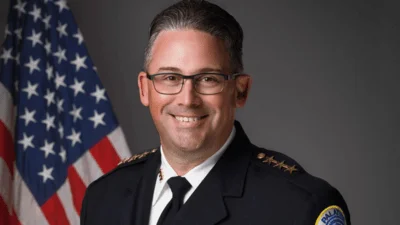Director of the University of Illinois' Institute of Government and Public Affairs Chris Mooney
Director of the University of Illinois' Institute of Government and Public Affairs Chris Mooney
The incoming state Senator representing Illinois' 27th District has said he agrees with term limits, though a University of Illinois political scientist maintains that term limits have not turned out the way supporters or opponents expected.
State Sen. Tom Rooney (R-Rolling Meadows) said during a recent "Chicago Tonight" interview that he recognizes how term limits have turned out elsewhere, but that he's in tune with what Illinoisans want and supports the idea.
"I think they're just a good idea all across the board," Rooney said. "I lived them personally in my town of Rolling Meadows when I was an alderman, stepping down voluntarily after two terms because I think we should. Cycling people through the seats of government is always a good idea."

State Sen. Tom Rooney (R-Rolling Meadows)
Rooney, then Rolling Meadows mayor, was elected in September by voters in the 27th state Senate District to replace Sen. Matt Murphy (R-Palatine), who reportedly resigned to pursue an opportunity in the private sector.
Rooney, who last year had been elected to his second term as mayor of Rolling Meadows, is a longtime supporter of term limits.
He seems to be of the same opinion as many Illinoisans. An October poll of 865 likely Illinois voters by the Paul Simon Public Policy Institute at Southern Illinois University indicated that over 80 percent support term limits at the state level.
The Illinois state Supreme Court historically has not been in step with those findings. In 1994, the court blocked a term limits measure on that year's ballot, claiming the ballot measure -- which proposed a new amendment -- was unconstitutional. The state's highest court again blocked a similar measure in 2014.
Term limits keep politicians from becoming comfortable and complacent, Rooney said during his "Chicago Tonight" appearance.
"Because when people get a little too safe in their chairs, they get a little too comfortable and that's not good for the people they serve," he said. "And so the power of incumbency in an election is just so gigantic that trying to get fair elections in the case where there's an incumbent is nearly impossible. And then when you couple that with the fact that the longer somebody stays, the more comfortable they get, that problem just feeds on itself. At some point saying 'you just can't be an incumbent anymore' helps to balance the scales a little bit for newer people to come in."
That, Rooney said, is the most substantive reason to have term limits. He believes the situation in Springfield is an example of what happens when none exist.
"The reason why you see these things going on in Springfield where they've gotten us to the position where we are right now is because the 'good-ole-boy if you'll help me with this, I'll help you with that,' that builds over time," he said. "Because these relationships go on for so many years. For people to be a little bit more removed is a better thing for all of us."
However, University of Illinois' Institute of Government and Public Affairs Director Chris Mooney, who appeared with Rooney on the same "Chicago Tonight" broadcast, countered that term limits implemented by other states haven't turned out as expected. He cited studies that have been conducted since such limits began to be adopted by state legislatures in the early 1990s.
"And what we've found, in studies that I've been involved with and others, is that mostly what the proponents and the opponents said about term limits really haven't panned out," Mooney said. "You don't get citizen legislatures, there's no difference in the demography, they're basically the same diversity, you don't get less spending, in fact you get more spending."
Term limit opponents have not gotten what they want either, Mooney said.
"Alternatively, the opponents who said, 'Oh, it's going to make lobbyists very powerful and staff very powerful,' that hasn't panned out either," he said. "In fact, lobbyists hate (it), staff get demoralized and go away."
But those aren't the concerns most voters look at when they want term limits, according to Rooney.
"They're looking at re-establishing trust, they're looking at knowing that somebody is not going to be sitting there for years, collecting a big pension at the end of it because they've been there for 30 years," he said. "I'm part of a small but growing group of people who turn down the pension coming in. If you can only serve 10 years, then what kind of a pension are you going to come out with and how would that be an incentive. Just having different people who know they constantly have to respond to you because they're not safe with their 20 years of experience in their seat is really what most people are looking for."






 Alerts Sign-up
Alerts Sign-up